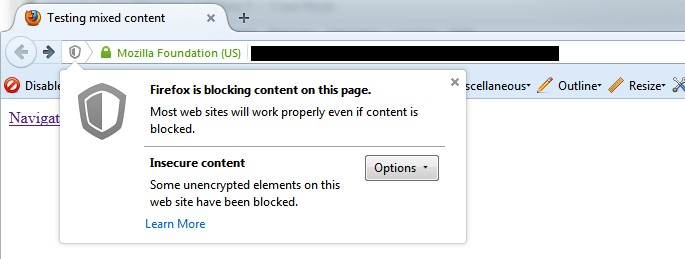
Coaches and service professionals are concerned with confidentiality, high integrity of their work product and being found. Obviously.
Without HTTPS [that lock on your browser] in your website address, you’re losing all three of those, which in my experience, isn’t so obvious for people.
Most coaches and service professionals with a website don’t know what HTTPS is, but they do know when their web browser tells them some content is insecure like the image below. HTTPS has to do with that.

You need HTTPS on your website if you’re going to continue doing business online. It’s at that point.
Seeing the word “insecure” in your web browser in places you didn’t see it before?Browsers have now started calling sites that aren’t using a specific type of protocol for forms insecure, nothing has changed about them, but the companies building the browsers, Mozilla is Firefox, Google is Chrome, etc, are trying to force more secure protocols. The downside, and likely not too important to you is that all website and business owners will have to start wrestling with adding the extra layer of security they are suggesting, which takes work to implement, which will cost website owners in one way or another, either to pay professionals to set it up, or to learn and do it themselves. The security they are calling for are akin to what banks use on their websites, or Facebook, it’s called SSL/HTTPS.
Will your site stop working if you don’t get on it?
No.
Will anyone proactively tell you about it?
No.
Will the sky fall down if you don’t do it?
No.
…but you will be left behind, your site will show up less online as Google prioritizes HTTPS websites, your customers browsers will tell them more about your site being insecure and you’re more likely to get hacked. This is already happening.
Maybe you’ve already experienced this on another website and chalked it up to “internet weirdness” … this isn’t really one of those things. asyabahis
What to do?
Learn what HTTPS is
The really short version is that it’s verifying your website with an organization that issues a certificate saying this website is A-OK, trust it! Then configuring your website in a way that loads all the content [pages, pictures, code] through that certificate HTTPS address. This part get’s rid of those “mixed content” alerts and encrypts/secures all the forms on your website.
Get it!
A few years ago HTTPS certificates cost around $70 a year, now they can be had for free through services like Cloudflare and Let’s Encrypt.
You still have to configure them to work with your website though and that’s where most people get hung up today, depending on your website’s platform, like WordPress or Squarespace, that looks different, and takes varying degrees of labor. Around 3-10 hours in estimation.
For instance, if you’re on WordPress and have been for years, you have years of content that’s been uploaded and coded to use HTTP, all that needs to change, and while it doesn’t have to all be done manually, there’s a lot of troubleshooting involved.
Again though, it’s worth the integrity, confidentiality, and SEO benefits of doing work in today’s digital world where your website is a key part of your income.
Okay, there it is, the more tips, ideas and advice you know from an SEO expert like Damon Burton, the better decisions you can make for your business, and it’s growth!
—> Interested in future proofing your business website, and getting HTTPS handled? IT Arsenal can do that, send us a request.
See you around!
